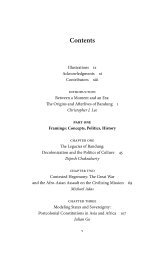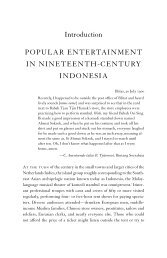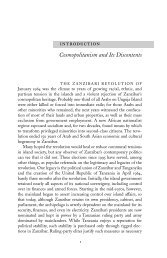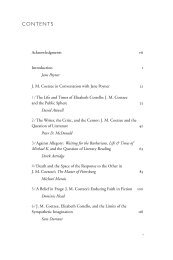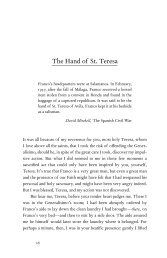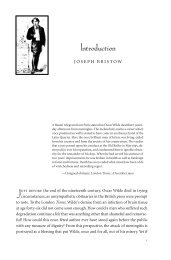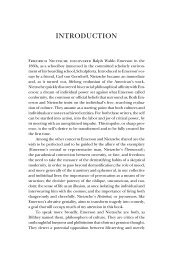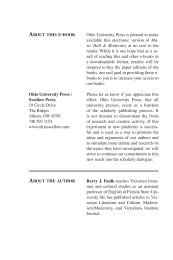Introduction
Introduction
Introduction
You also want an ePaper? Increase the reach of your titles
YUMPU automatically turns print PDFs into web optimized ePapers that Google loves.
man who left his bank job to work for the company observed, the Cadburys<br />
“somehow conveyed the idea that their purpose was to do something for one,<br />
rather than to get the last ounce in the way of work; I think they generally did<br />
get the fullest in service, but they attracted it—they did not force it.” 9<br />
Employees were encouraged to continue their education, and the<br />
company provided a variety of on-site training programs. Sport was another<br />
welcome diversion, and William Cadbury played on the Bournville football<br />
and cricket teams and served as vice president of the Bournville (Men’s) Athlete<br />
Club when it was established in 1896. 10<br />
While William Cadbury dutifully embraced his responsibilities at the<br />
family firm, Joseph Burtt succumbed to a “crisis of conscience.” In 1898, after<br />
almost twenty years working for the Gloucestershire Bank, he turned down<br />
a promotion to manager, quit his job, and helped found the utopian Whiteway<br />
Colony near Stroud in rural Gloucestershire. The strikes and industrial<br />
violence in several British cities in the late 1890s seem to have influenced<br />
Burtt’s decision to leave a promising career at age thirty-five. “It is hard to<br />
say,” he would later recall, “if it was the horror of industrial cities or the degradation<br />
of the workers, or shame in my participation in an evil system that<br />
gave me a passionate desire to escape to some spot where I and my friends<br />
could settle and cultivate the land.” 11<br />
In our age, we might be inclined to think that Joseph Burtt had had a<br />
midlife crisis, but his rejection of capitalism and his search for a “practical<br />
utopia” had a long history in England. Among the late nineteenth-century<br />
experiments was George Cadbury’s Bournville Village, his response to the<br />
growing recognition of poverty in Britain. His fellow Quaker B. Seebohm<br />
Rowntree would publish a statistical study, Poverty: A Study of Town Life, in<br />
1901. Ebenezer Howard’s town-planning manual, Tomorrow: A Peaceful Path<br />
to Real Reform, also captured the growing concern with social reform. First<br />
published in 1898, it envisioned “slumless smokeless cities” with easy access<br />
to public transportation and public gardens. Reissued numerous times under<br />
the title Garden Cities of Tomorrow, the manual embodied the concerns of<br />
many Britons about the potentially dehumanizing effects of industrialization,<br />
especially on the working poor. 12<br />
The founders of Whiteway Colony belonged to a variety of Left-leaning<br />
organizations, including the Fabian Society, the Independent Labour Society,<br />
and especially the Croydon Brotherhood Church. Minister John C. Kenworthy<br />
opened his church—ten miles southeast of London in Croydon—each Sunday<br />
afternoon to “every kind of ‘crank,’ . . . Atheists, Spiritualists, Individualists,<br />
Chocolate Islands



